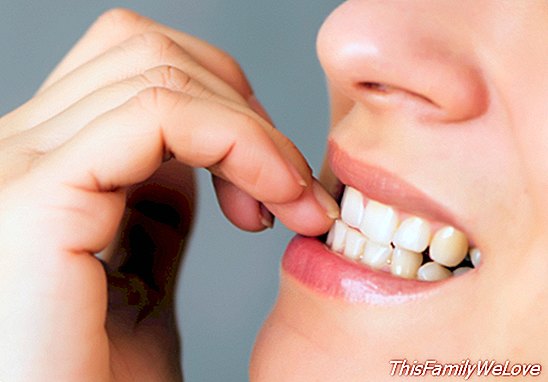6 habits that hurt your teeth without you knowing
Show a beautiful smile, full of white teeth and well aligned, is the dream of many and an unmistakable sign of a great oral health. However, sometimes due to ignorance, we do some things in our daily life that can cause long-term damage to our teeth and we are not aware of it. Many of these bad habits can not only ruin our teeth, but also can be the cause of various oral diseases.
6 habits that damage your teeth without you knowing
1. Biting the nails. It damages the appearance of your hands, but it also damages the teeth when the teeth clash against the nails. When this happens abruptly, small enamel prisms are detached, resulting in microfractures that weaken it. In addition, the hands to be in contact with a large number of objects are a focus of bacteria, which we take to the mouth by biting our nails. This habit increases, therefore also, the risk of caries.
The bite of the nails can also generate other oral pathologies, such as damage to the joints of the jaw. An example is temporomandibular joint disorder, or TMJ, a condition that affects the bones and muscles that connect the skull to the lower jaw.

2. Abusing citrus fruits. During the cold months, to avoid flu and constipation, the intake of vitamin C is recommended and this causes us to abuse the consumption of citrus fruits such as oranges and tangerines. However, it has been shown that the acids present in citrus fruits weaken tooth enamel, increasing the risk of tooth decay, as well as increasing tooth sensitivity. For this reason, it is advisable not to abuse them and take extreme hygiene measures after eating them.
3. Biting pens, pencils or any other object. This is a very common mania that can cause great oral damage. By tightening these objects between the teeth, in addition to causing pieces of plastic or wood to fall off, micro-rotors can be caused in the teeth, due to the force exerted.
4. Use the teeth as a multipurpose tool. Small gestures such as cutting thread when sewing or moistening and passing it between the teeth, opening bottles or using the teeth to hold something, even for a moment, can cause the appearance of small notches in the teeth or severe breaks and, in the long term, cause the denture to lose its regularity. All these actions damage the denture.
5. Use chopsticks. The use of toothpicks to remove food debris from the teeth damages the gums and teeth. The tip of the toothpick can cause small wounds in the gums and open interdental spaces. To remove remains of food, the best after brushing is to use floss or interproximal brushes that reach places where the brush has no access. Its use should be part of your daily oral hygiene routine, in addition to brushing, to get a full cleaning of your mouth.
6. Brush your teeth right after eating. It is much better to wait at least half an hour before brushing your teeth. The reason is that the pH of the mouth changes. When we drink acid, soft or sweet foods, the pH of the mouth becomes more acidic, which weakens the tooth enamel. If nothing else to eat we brush our teeth the friction of the bristles of the brush against them can damage the enamel, making the denture more susceptible to the attack of the bacteria present in the mouth. During that half hour it is advisable to drink water or chew gum to favor the production of saliva and so the pH of the mouth is restored as soon as possible.
Marisol Nuevo Espín
Advice: Dr. Iván Malagón, specialist in Orthodontics and Maxillofacial Orthopedics of Iván Malagón Clinic




